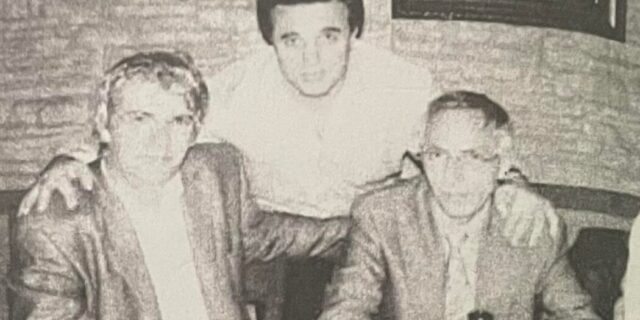Sylejman Gashi
NEW YORK
Throughout the history of the Albanian people, the Highland and the Highlanders have been at the forefront of the struggle for freedom and independence. They have shed their blood to defend the integrity of their ethnic lands.
The tradition is alive and kicking here in New York as well. And no one exemplifies it better than Nua (Nikollë) Dedivanaj.
In 1981, the streets of Kosova were washed in blood because the Albanian people demanded equality with the other people of the Yugoslavian Federation. For this they were tortured, brutalized, and massacred. In the following years, Albanian Highlanders have led the way in many rallies held in front of the United Nations headquarters and other institutions, in support of their brothers in Kosova, whose national rights were violated by the Serbian-Yugoslavian state.
A prominent presence in these rallies is Nua (Nikollë) Dedivanaj, from the well-known Highlander patriotic family of Zef Tomë Hasurit-Dedivanaj from Trieshi of Malësia e Madhe (Great Highland in Albanian). Nua understands the plight of the Albanians in Kosova better than many others, as he knows from personal experience the injustice and the oppression of the Yugoslavian regime.
As a young man, only 18-year-old, he had traveled in May 1981, from Ljubljana, Slovenia to Malësia e Madhe, in Montenegro, to spend a few days with his family. It was there that a conational, who turned out to be a spy, instigated a provocation, by asking him, “what’s new from Slovenia?”
“The Republic of Kosova, that’s what’s new,” was the curt reply by Nua Dedivani.
“Why are you supporting the Kosovars? They enjoy all the rights. We’re not Kosovars, we’re Highlanders so you don’t need to carry water for them,” the spy angrily retorted.
Nua (Nikollë) Dedivanaj, of Trieshi in Malësia, who, at the time, was living and working in Ljubljana, Slovenia, saw through the provocation, but could not let the issue drop: “The Kosovars are our brothers and are asking for nothing more than equality to the rest of the people of the Yugoslavian Federation. Their basic and elementary rights are being violated in the most barbaric way. The Kosovars have worked hard to provide their children with education only to see the jobs go to Serbs and Montenegrins. If only the Kosovars were properly armed, you would see all the Serbs return to the Carpathians, where they came from.”
The grim-faced spy then threatened him: “You will answer very soon for what you just said.”
The next day, several plain-clothed and uniformed police officers showed up at his home in Trieshi to arrest Nua Dedivanaj. They were greeted by his father, Nikolla, at the doorstep.
“May you bear good news,” he said. “What brings you here? Come inside and have a coffee or raki for the Highlander’s home is open to everyone.”
“We are not here for coffee. We’re here to arrest your son,” the police officers said.
“May it be for the best, but why my son? It is not like him to steal,” Nikolla said.
“He has done nothing like that but he seems to love Kosova a bit too much”, a Serbian-Montenegrin police officer said to him in Serbian-Croatian.
“You want to arrest him for loving his own people?!” a stunned Nikolla replied. The father of Nua Dedivanaj was now feeling both proud and deeply concerned.
They took Nua away in handcuffs, in front of his mother and father, and after a quick political trial, convicted him with a misdemeanor. Thankfully, a relative, who was then employed in higher structures of the Yugoslavian regime, agreed to intervene, and managed to release him from prison.
With a sentence in his record, however, the young man’s prospects for work and a normal life were bleak. As a consequence, in 1984, he immigrated to the United States of America and settled in New York.
Nevertheless, Nue Nikollë Dedivanaj never interrupted his patriotic activity and is a front-row presence in every rally or meeting whether it is dedicated to the freedom and the independence of Kosova, or to the legitimate rights of the Albanian people throughout their historic lands in Macedonia and Montenegro. His conduct and character have made him a beloved community member to all his Albanian-American co-nationals in New York and beyond. He personifies the highest virtues inherited from his parents and his Highland forefathers, like hospitality, sincerity, Besa, and the love for the fatherland.
Nua Dedivanaj is the owner of a construction and home renovation company which has been operating in New York for many years now. And he is, without any exaggeration, a rare artist in his profession. He is married to Angjelina of Nush Gjelaj from Thethi of Shala, a notable family, renowned for their noble and patriotic traditions. They have two children, Pjetër and Tomë. Although they were born in America, the boys have been raised by their parents according to the best Albanian traditions.
Nua Dedivanaj, or Tony, as he is widely known here in New York, has given precious moral and material contribution to the cause of freedom and independence of Kosova, which ended centuries of Serbian occupation, as well as significant financial aid to the needy in Malësia e Madhe and elsewhere.
An exemplary man, just like in 1981, when he demonstrated his youthful bravery in defense of the Albanian rights in Kosova, and faced prison and maltreatment, Ndue (Nikollë) Dedivanaj of Trieshi in Malësia e Madhe, remains committed here in diaspora as well in his service to the nation. A great role model in the Albanian-American community.
1998, New York
